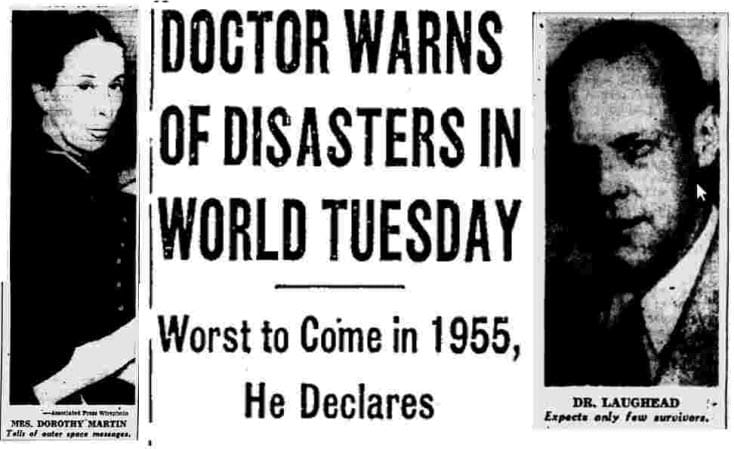Can AI change what we believe?
It’s the winter of 1954, and a small group of devoted believers are gathered in Dorothy Martin’s cozy living room in Oak Park, Illinois.
The air is filled with anticipation.
Dorothy, a housewife turned spiritual leader, had received messages from beings she called the "Guardians," who told her that an alien spacecraft would come to save them from an upcoming disaster.
The believers, who called themselves the Seekers, truly believed they were chosen for this rescue.
They had spent weeks getting ready, some had even quit their jobs, given away their belongings, and cut ties with those who doubted them.
As the clock ticked towards midnight, the group held hands, whispering prayers, eyes fixed on Dorothy.
Midnight struck.
The minutes dragged on.
The silence grew heavier, broken only by the sound of nervous shuffling and anxious sighs.
Nothing happened.
There were no bright lights in the sky, no rumbling of an alien spacecraft, only the quiet disappointment that filled the room.
It would have been reasonable for the group to abandon their belief at that point.
But instead, something surprising happened.
In the days that followed, Dorothy’s followers became even more convinced of their beliefs.
They insisted that their devotion had stopped the disaster, that their faith had saved not only them but the entire world.
Instead of giving up, they doubled down.
This moment shows the strength of belief, even when faced with clear disproof, and speaks to something deep within human nature: the desire to find meaning, even when reality falls short.

The nature of belief
The story of Dorothy Martin’s group isn’t unique, it just shows human nature.
Belief, for many, isn’t just about evidence: it’s deeply tied to identity, community, and purpose.
When we believe in something—whether it’s aliens or a higher power—we're often not swayed by facts alone.
Instead, belief becomes a way to give meaning to our lives, something that goes beyond simple knowledge.
Psychologists call this "belief perseverance", it's the tendency to hold onto our beliefs even when faced with evidence that contradicts them.
It’s a powerful anchor that keeps us grounded, even when everything around us feels shaky.
AI and the question of God
I see many people on Reddit debating whether AI could disprove God's existence and shatter the world.
But I don’t think it would.
Rather than abandoning their beliefs, many religious followers might see such a claim as a challenge, not as proof against their faith.
The AI’s statement could even strengthen their convictions, much like the absence of aliens did for Martin’s followers.
Confronting a higher authority—even an AI—could reinforce their belief that faith transcends machines and logic.
This can be explained by cognitive dissonance (the discomfort we feel when faced with information that contradicts our beliefs).
To ease this discomfort, we often find ways to justify our beliefs, even if it means bending reality a bit.
In the case of AI saying there is no God, believers might question the AI’s understanding, saying it lacks a "spiritual side" or that its logic, no matter how advanced, cannot understand the mysteries of the divine.
This reasoning helps them keep their worldview and identity intact, allowing them to hold onto their faith despite new information.
Because a belief isn’t just about accepting facts: it’s tied to who we are, our relationships, and our communities.
Letting go of a core belief isn’t just changing your mind, it’s a major shift that can disrupt your entire life.
Imagine if you had spent your whole life devoted to your church.
Your family members are all Christians, your closest friends are people you've met through your faith community, and the rhythm of your daily life revolves around church events, prayers, and gatherings.
Your faith is not just a belief: it’s your community, your support system, and your identity.
Letting go of that belief would mean losing the community that supports you, the rituals that bring you comfort, and the identity that defines you.
It would mean facing a deep emptiness where once there was certainty and purpose.
This is why, even in the face of AI’s statements, many will continue to hold onto their faith.
Letting go of such beliefs could mean letting go of a part of themselves, their support systems, and their sense of purpose.
The arrival of AI will deeply change society, but when it comes to faith, history suggests that beliefs will endure.
Belief is a deeply human experience, one that is not easily swayed by data or logic.